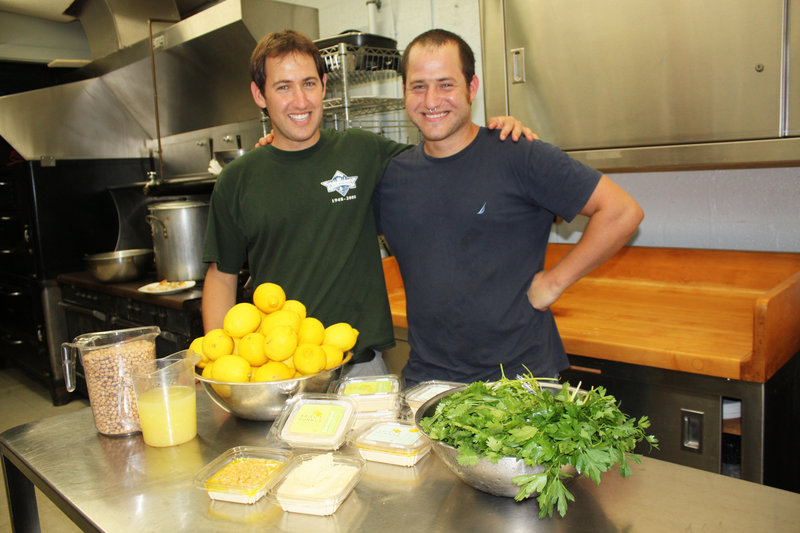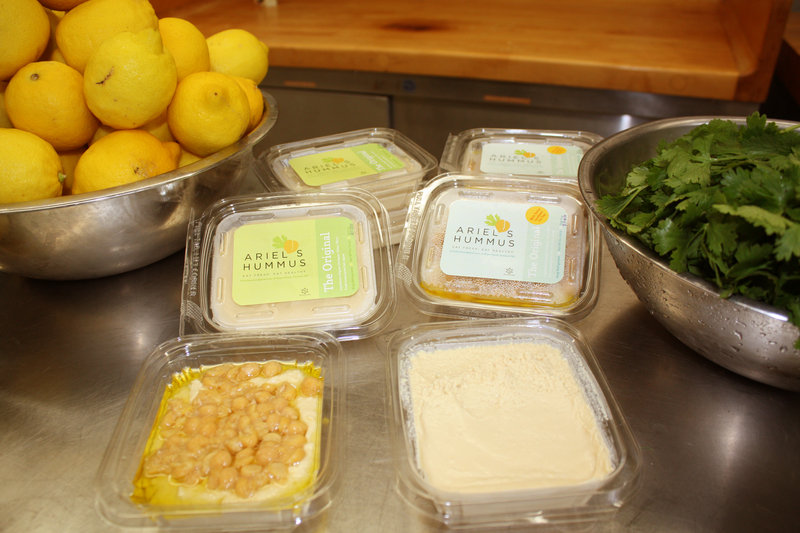The career path from investment banker to hummus maker may not be the most typical, but for Ariel Glazer, the move is paying off.
All summer, Glazer’s been selling his namesake hummus – and most often selling out – at the Portland Farmers Market on Wednesdays, at the Freeport Farmers Market on Fridays and at a number of local shops.
“There’s one main thing that led me to Maine,” Glazer said. “My wife.”
Glazer’s wife is an attorney, and when she landed a job clerking for a federal judge in Portland, he resigned from his position at Goldman Sachs’ office in the Boston area and moved to Maine.
“I figured, why not start a hummus business?” said Glazer, who grew up in Rehovot, Israel, south of Tel Aviv.
Actually, getting into the hummus business wasn’t as simple as Glazer makes it sound.
First, he spent months testing hummus recipes until he got it just right. Then he put in long hours sourcing the highest quality chickpeas, tahini and olive oil, which aren’t as plentiful in Maine as they are in Israel.
“Unlike humans, not all chickpeas are born equal,” Glazer said jokingly.
He ended up contacting suppliers in New York, Boston, Florida and the West Coast, and testing samples before he found the best ingredients. He now buys his organic chickpeas from a local distributor and his tahini from a supplier in Connecticut.
“Overall, I probably spent two years experimenting with the recipe and looking for good ingredients,” Glazer said, including the time before he moved to Maine when he began experimenting with hummus recipes and testing them on his Goldman Sachs colleagues.
With little competition in Maine for fresh-made, preservative-free hummus, Glazer decided to take the plunge and launch Ariel’s Hummus in May. As demand surged, he was soon spending 12 to 14 hours a day in the commercial kitchen at the Shaarey Tphiloh synagogue in Portland, cooking up hundreds of pounds of chickpeas every week.
“I was bogged down with work, and I wasn’t sleeping,” Glazer said. “So I called up (my brother), and he was on the next plane.”
Amit Glazer arrived in Portland from Tel Aviv a little more than two weeks ago. Having worked at multiple restaurants in Israel, Amit’s culinary background meant he quickly hit his stride chopping cilantro and cooking chickpeas alongside his brother.
“I was very surprised to hear he was making hummus,” Amit said. “I thought I’d come here and tell him it’s not so good.”
Instead, Amit was pleasantly surprised by how flavorful the hummus actually is.
“It tastes like more,” Amit said, using a popular Israeli phrase for food you can’t get enough of.
Ariel’s Hummus is sold in three varieties: The Original, The Original with Extra Goodness on Top, and Chipotle Cilantro. Each 8-ounce container sells for $4.50.
“Making the hummus is a long, painstaking process,” Amit said. “Both of us have aged a few years.
“It’s about doing it as it should be done. If we don’t feel it tastes right, we’ll throw (out the whole batch). The upside is, we don’t stay up until 4 a.m. packing it.”
The brothers now make 500 to 800 8-ounce containers of hummus each week.
At the crossroads of Middle Eastern culture, Israel has embraced hummus as a dietary staple, according to the Glazer brothers.
“We were basically raised on hummus,” Ariel said.
On the block where he lived in Tel Aviv before he hopped a flight to Maine, Amit said, there were “three good hummus businesses and two bad hummus places.”
In Israel, the popular chickpea spread is served at all meals, including breakfast. Israelis even have a Hebrew word for the proper way to consume hummus: “lenagev.” It means to wipe hummus with pita bread.
“Israel is a new country, and the culture is in the making,” Amit said.
This evolving culture is heavily influenced by its Middle Eastern neighbors, and when it comes to hummus, it’s common to find numerous ethnic varieties for sale in any Israeli town. For instance, Lebanese hummus tends to have more greens and a zestier flavor, while Egyptian hummus is typically made with black beans and served with an egg on top.
Once he arrived in Maine, Amit was taken aback by the strange flavor combinations of American supermarket hummus, such as roasted red pepper or even, oddly enough, pizza hummus.
“I’m sure the Israelis and all the Arab countries can agree there is no such thing as pizza hummus,” Amit said, jokingly.
Could hummus be the solution to Middle Eastern peace? We’ll have to wait and see.
In the meantime, the Glazer brothers are committed to making the best hummus in Maine.
And despite the unlikely career path, Ariel said hummus making and investment banking, known for its notoriously grueling work schedule, are rather similar.
“The hours are not so different,” Ariel said.
He paused before adding, “Well, actually, I think I work more here.”
Staff Writer Avery Yale Kamila can be contacted at 791-6297 or at: akamila@pressherald.com
Twitter: Twitter.com/AveryYaleKamila
Send questions/comments to the editors.




Comments are no longer available on this story